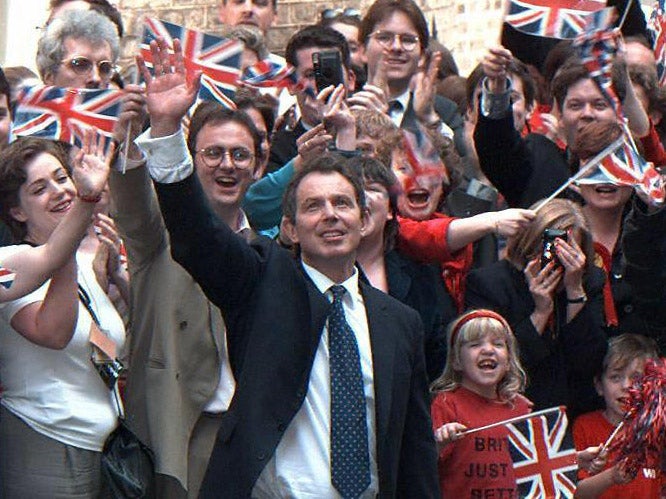The Independent's journalism is supported by our readers. When you purchase through links on our site, we may earn commission.
1997 all over again? The state we’re in today is even more precarious
A tired, scandal-hit administration on the brink of conceding power after eviscerating public services and the underlying economy… the parallels with the Major/Blair years are clear, says Will Hutton. But so, too, are the worrying and profound differences


2024 has eerie parallels with 1997. Then, a politically out-of-time Tory government was decaying before our eyes. The triumvirate at its head – John Major, Michael Heseltine and Ken Clarke – may not have believed in the pure milk of Thatcherism, nor its bastard child, Euroscepticism, but they were trapped in a party already beginning to lose its head to an increasingly confident hard right.
The wounds and inequalities in British society had to be healed and the alarming run-down of our public services addressed – but little of that preoccupied the right, obsessed then as now with Europe. Nor did they care much about an economy that was going nowhere. Even the British state and democracy seemed mired in misconduct and scandal. Reflecting the hunger for change, Tony Blair would sweep to power.
Twenty-seven years later, the parallels are obvious, and after last week’s local and mayoral elections, so seems the sequel – Keir Starmer repeating Blair’s success.
But there are worrying, even profound, differences.
Plainly, while another Tory government is rotting before our eyes, its leadership is much more disconnected from the mainstream than their predecessors in the 1990s. It presides over a party that has collapsed into a federation of warring cults, with its ultra-right – kept at bay three decades ago by Major – now ruling the roost, obsessing about tax cuts, slashing immigration and abandoning the European Convention of Human Rights.
Incredibly, one prime minister who could not outlive a lettuce and another who was incapable of telling the truth are entertaining political comebacks – without being laughed out of court. Centre-right political culture is in profound decay.
As are our public services, so much of British society, and the underlying economy – much more far gone than in the run-up to the 1997 election. British median incomes per head are below those in Slovenia. Productivity is stagnating, as are wages adjusted for inflation. The stock market has slid from number three in the world in 2000 to number nine today. Only one high-tech FTSE 100 company has survived takeover over the last 25 years. Investment is lower by some margin than our competitors.
Nearly 10 million people are either waiting for an operation or a hospital appointment. Only one in 10 science teachers in schools in deprived areas has a science qualification. Our five-year-olds are the shortest in Europe, with malnutrition the chief cause. Two out of five local governments are forecast to go bust in the next two years. The overcrowded prison system is a disgrace. The country is reeling, not only from 14 years of misgovernance, including austerity and Brexit, but catastrophic earlier errors – 1980s monetarism and financial deregulation, which lead straight to the Great Financial Crash of 2007-8.
Writing The State We’re In in the run-up to the 1997 election, I thought the policy trajectory demanded reversing, and there were grounds for believing that Britain could be turned round. The difficulty was that too many in the British political, financial and business class were unpersuaded about the case for root-and-branch reform: it was too “corporatist” or “ left wing”.
Now, the starting point is very much worse, not least in that so much of the right-wing political and media ecosystem still refuses to accept that it is their policy mix – attempting to shrink the state to “crowd in” business investment, aided and abetted by deregulation, privatisation and low taxation – that is the intellectual root of our current malaise.
The good news is that mainstream opinion is changing in a way it was not in 1997. Boards of British companies are now dismayed at their low stock market valuation, which forces them into defensive business strategies; City leaders recognise that a strong City of London requires a strong UK economy, which they must support much more than they have done historically.
Everyone accepts the need for more investment, and the change in policy and institutions needed to bring it about. Brexit is acknowledged as a debacle, even if the Conservative Party – the once pro-business party – does not. The public at large have come to detest the Tories, blithe authors of so much decline and hardship.
Tony Blair was advised to keep his distance from The State We’re In for fear he might be cast as anti-business and anti-“wealth generation”. Keir Starmer, reading the runes, is unafraid to associate himself with and endorse my current book, This Time No Mistakes: How to Remake Britain, which builds on the arguments made by its forerunner 28 years ago.
Britain in 2024 is in a much worse state than in 1997 – but, paradoxically, it may be in a better place to begin the long hard road back.
Will Hutton is president of the Academy of Social Sciences and host of the We Society podcast. His latest book, This Time No Mistakes: How to Remake Britain, is out now, published by Head of Zeus (£25)
Join our commenting forum
Join thought-provoking conversations, follow other Independent readers and see their replies
Comments
Bookmark popover
Removed from bookmarks